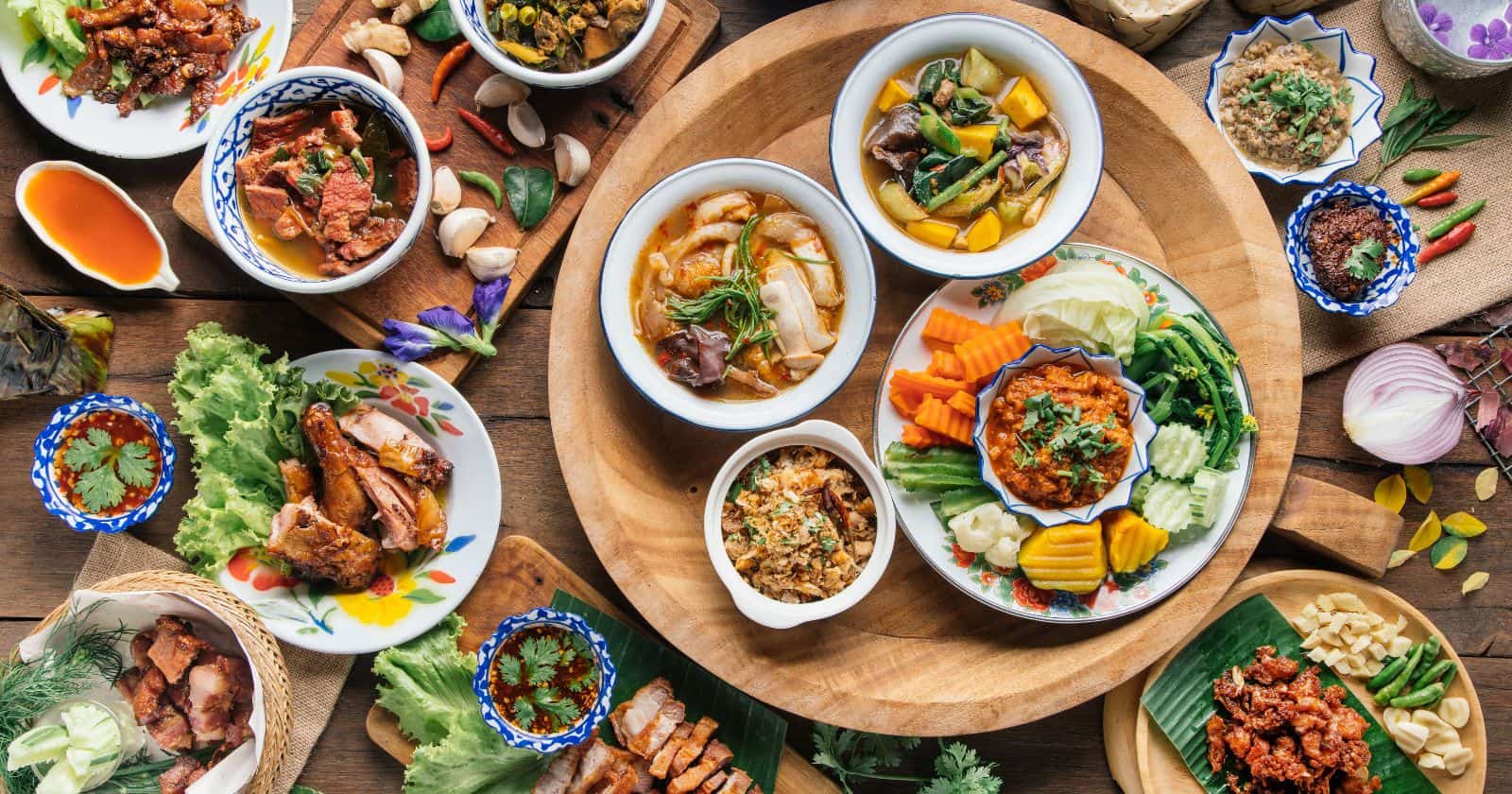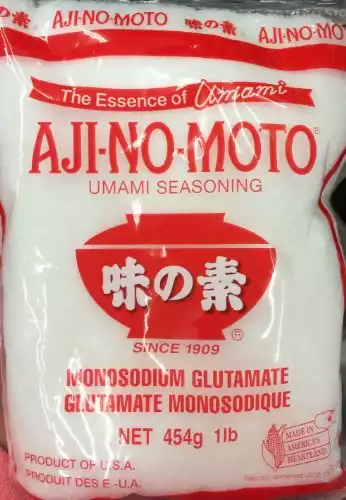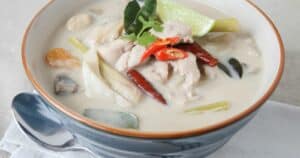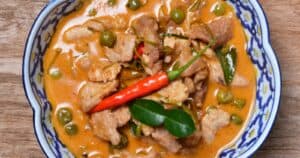Does Thai food have MSG? Yes, it’s true that many Thai dishes contain added MSG, or monosodium glutamate. This controversial flavor enhancer is used to amplify the savory umami taste that makes dishes irresistible.
But while MSG usage is common, it’s not universal. Some Thai restaurants proudly tout “No MSG” to appeal to health-conscious diners. And certain traditional dishes avoid MSG entirely.
So the reality is nuanced. Thai cuisine’s relationship with MSG is complex, not black and white.
In this article, we’ll explore the nuances around MSG in Thai food. You’ll learn why MSG became popular in Thai cooking, how it may impact health, which iconic dishes use it, and how to enjoy delicious Thai cuisine without MSG.
You’ll get the full story on this little flavor enhancer that has caused big debates. So grab your chopsticks and let’s dig in!
The Allure of Umami: MSG’s Role in Thai Cooking
To understand the use of MSG, we must first talk umami. Umami is the savory, mouthwatering flavor associated with meat, cheese, and mushrooms. It makes food irresistibly delicious.
MSG contains glutamate, which triggers our umami receptors. That’s why this additive boosts the rich, savory taste of dishes.
In Thai cooking, MSG brings out the best in ingredients like:
- Aromatic herbs and spices
- Fermented fish sauce
- Tart lime juice
Without MSG, achieving the perfect balance of flavors requires meticulous technique. MSG makes the process easier and more consistent.
This explains its prevalence in Thai restaurants and households. MSG offers both flavor enhancement and cost savings. For small restaurants, MSG can be crucial.
However, some higher-end establishments now advertise “No MSG” to attract health-conscious diners. The landscape is evolving.
The Rise of MSG in Thai Cuisine
The use of MSG in Thai cuisine surged starting in the 1960s and 70s. Several key factors drove this rapid adoption of MSG:
- MSG became easily mass-produced and inexpensive.
- Thailand’s cuisine gained more international prominence and appeal.
- More women entered the workforce, relying on MSG to save time in cooking.
- MSG fit seamlessly into Thai cooking’s complex medley of flavors.
This modern era transformed the relationship between Thai food and the flavor enhancer MSG. What was once an occasional ingredient became a ubiquitous staple in both restaurants and home kitchens.
The rise of MSG reshaped the taste profile of Thai cuisine as we know it today. Those signature savory, mouthwatering flavors largely stem from the magic of MSG.
Evaluating the Health Effects of MSG
Now let’s talk science. What are the health implications of consuming MSG?
Despite the controversy, major regulatory agencies like the FDA, WHO, and EU Food Safety Authority recognize MSG as safe for consumption by the general public.
However, some key considerations include:
- MSG symptom complex – A small subset of individuals may experience reactions like headaches or flushing. But prevalence is less than 1%.
- Asthma – Some studies link high MSG intake to worsening asthma symptoms. But the data is inconclusive.
- Obesity – While animal studies connect MSG to weight gain, human studies show inconsistent results. More research is needed.
So for most people, moderate MSG consumption should not pose risks. But those with sensitivities or chronic conditions like asthma may wish to avoid it.
Talk to your doctor if you have concerns about MSG in your diet. They can help you make informed decisions.
Popular Thai Dishes That Frequently Contain MSG
Now let’s explore some beloved Thai dishes that often contain MSG:
- Thai Curries – Red, green, massaman – MSG accentuates the rich curry paste and coconut milk.
- Pad Thai – The MSG balances the sweet, tart, savory flavors in this iconic noodle dish.
- Tom Yum Soup – MSG makes this hot and sour soup even more crave-worthy.
- Fried Rice – MSG provides a savory umami base that fried rice absorbs beautifully.
- Larb/Meat Salads – MSG amplifies the bold flavors of the chili, lime dressing.
- Som Tam – The classic green papaya salad gets bold flavor from chilies, palm sugar, lime, and peanuts.
Of course, MSG usage depends on the specific restaurant or recipe. But these dishes commonly rely on the flavor-enhancing properties of MSG.
MSG Monosodium Glutamate, Made in USA, Naturally Delicious (One Bag per order) Ajinomoto is very popular MSG that use in Thai restaurants and Thai households.
Popular Thai Dishes That Are Naturally MSG-Free
While many Thai dishes rely on MSG for full flavor, some traditionally avoid it entirely. Here are some quintessentially Thai meals you can enjoy MSG-free:
- Gaeng Liang – A soothing, herbs-packed soup with an aromatic broth.
- Khao Man Gai – Hainanese chicken rice made delicious by proper poaching technique, ginger, and garlic.
- Khanom Jeen – Fresh, vermicelli noodles served with spicy, umami-rich curries and condiments. (Some may include MSG so ask restaurants before order to make sure.)
With thoughtful seasoning, Thai cooks can achieve vibrant flavor without any MSG at all.
Enjoying Thai Food Without MSG
If you wish to avoid MSG, several options exist:
- Ask “No MSG Please” – Most restaurants will accommodate requests to omit MSG. Just say “Mai sai phong-chu-rot nah.”
- Look for “No MSG” Signs – Some eateries advertise no MSG to attract health-conscious diners.
- Choose Dishes Less Likely to Have MSG – Grilled meats, rice, and fresh salads are good bets.
- Prepare Thai Food at Home – When cooking yourself, you control the ingredients.
- Use Natural Umami Flavor – Mushrooms, soy sauce, and dried shrimp offer glutamate without MSG.
With flexibility and strategic choices, you can still enjoy authentic Thai cuisine without MSG. You won’t miss out on that addictive Thai food flavor.
The Verdict on MSG in Thai Cooking
So where does this leave us? Here’s a summary of key points:
- MSG is widely used in Thai cooking for its flavor-enhancing properties. But not all restaurants use it.
- For most people, MSG consumption is safe in moderation. But those with sensitivities should avoid it.
- Many iconic Thai dishes rely on MSG to balance their complex medley of flavors.
- With knowledge and effort, you can still enjoy Thai cuisine without MSG.
Rather than vilifying MSG, we should focus on options and education. Understanding the nuances allows us to make informed choices that suit our health needs and taste preferences.
So savor the diverse flavors of Thai cuisine – with or without MSG! Just be adventurous and keep an open mind.






